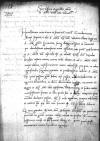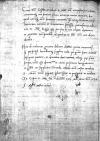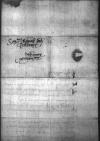Accepi superiori die Serenisimae Maiestatis Vestrae ⌊⌋ veterem illam erga me Serenisimae Maiestatis gratiam spirantes sumque illis gravissime et innocenter per clandestinos adversarios meos afflictus, non parum exhilaratus, quod Serenisima Maiestas Vestra visa mihi est ex relatione generosi domini ⌊Nicolai Grabya⌋ iustam meam contra mihi obiecta et ad Serenisimam Maiestatem Vestram inique delata iustificationem meam admisisse, pro qua in rebus cognoscendis singulari aequitate et prudentissimo iudicio Serenisimae Maiestatis Vestrae, quas possum, gratias habeo et, si possem, maiores habiturus, si cognitis delatoribus et illorum delationibus auditis me coram Serenissima Regia et Reginali Maiestate Vestra iustificare innocentiamque et fidem meam manifestiorem facere et illos, quales sint et quanti veritatis osores, omnibus declarare possem. Quod si mihi negabitur, tempus nihilominus et veritas ipsa, quae omnium rerum fortior est, omnia in lucem dabunt.
Quod tam graviter reverendissimus dominus ⌊archiepiscopus Gneznensis⌋, qui paulo ante per litteras in gratiam mecum rediit, contra me questus est, non erat sufficiens causa, ut hoc faceret illiusque dominatio reverendissima paulo post innocentiam meam liquidius cognoscet.  BNW, BOZ, 2053 TG 17, No 2051, f. 148v Cum ⌊domino Costka⌋, ut voluit Serenisima Maiestas Vestra, composita sunt omnia convenimusque non sermone solum, verum et amico convictu. Hoc, quod utriusque nostrum honorem concernit ipsorumque ⌊dominorum consiliariorum terrarum et civitatum Prussiae⌋, permisimus arbitrio ⌊serenissimae maiestatis regiae⌋, quae pro sua in nos omnes clementia et aequitate incomparabili id, quod ex re omnium nostrum erit, diiudicabit. Has ob oculorum gravem dolorem dictavi potius amanuensi, quam praescripsi, humillimeque supplico, velit per gratiam suam in bonam suscipere partem et clementer dare veniam mihique, quae fuit semper, domina esse clementissima, in cuius pristinam benignitatem et gratiam me suppliciter commendo. ⌊Christus⌋ Dominus noster eandem Serenisimam Maiestatem Vestram sospitet quam diutissime et prosperet in omnibus.
BNW, BOZ, 2053 TG 17, No 2051, f. 148v Cum ⌊domino Costka⌋, ut voluit Serenisima Maiestas Vestra, composita sunt omnia convenimusque non sermone solum, verum et amico convictu. Hoc, quod utriusque nostrum honorem concernit ipsorumque ⌊dominorum consiliariorum terrarum et civitatum Prussiae⌋, permisimus arbitrio ⌊serenissimae maiestatis regiae⌋, quae pro sua in nos omnes clementia et aequitate incomparabili id, quod ex re omnium nostrum erit, diiudicabit. Has ob oculorum gravem dolorem dictavi potius amanuensi, quam praescripsi, humillimeque supplico, velit per gratiam suam in bonam suscipere partem et clementer dare veniam mihique, quae fuit semper, domina esse clementissima, in cuius pristinam benignitatem et gratiam me suppliciter commendo. ⌊Christus⌋ Dominus noster eandem Serenisimam Maiestatem Vestram sospitet quam diutissime et prosperet in omnibus.
 BNW, BOZ, 2053 TG 17, No 2051, f. 149v
BNW, BOZ, 2053 TG 17, No 2051, f. 149v
 BNW, BOZ, 2053 TG 17, No 2051, f. 148r
BNW, BOZ, 2053 TG 17, No 2051, f. 148r
 BNW, BOZ, 2053 TG 17, No 2051, f. 148v Cum
BNW, BOZ, 2053 TG 17, No 2051, f. 148v Cum 

